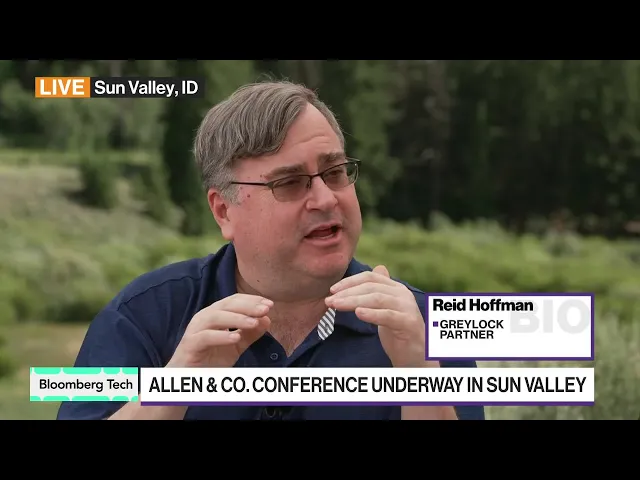Reid Hoffman on the Multimillion-Dollar AI Talent War

AI talent race impacts business competitiveness
In a recent interview that caught my attention, LinkedIn co-founder and tech visionary Reid Hoffman offered a sobering perspective on one of today's most pressing business challenges: the fierce competition for AI talent. The discussion highlights how companies across industries are engaged in what amounts to a high-stakes bidding war for professionals who can build, deploy, and manage AI systems. This talent squeeze isn't just affecting tech giants anymore—it's becoming a fundamental business concern for organizations of all sizes.
The AI talent landscape is transforming rapidly
-
The competition for AI talent has reached unprecedented levels, with companies offering compensation packages worth millions of dollars to secure top performers—particularly those with experience building large language models or deploying AI at scale. This isn't limited to Silicon Valley startups; traditional enterprises now recognize AI expertise as essential to their competitive positioning.
-
The shortage spans multiple levels of technical talent, from research scientists developing cutting-edge models to engineers who can effectively integrate and deploy AI systems into production environments. Hoffman notes this creates a multi-tiered market where different skill sets command different premiums based on their scarcity and impact.
-
Organizations are responding with creative talent strategies beyond just compensation, including establishing specialized AI labs, offering unusual degrees of autonomy, and creating environments where technical talent can pursue meaningful work with minimal bureaucratic friction. The most successful companies are treating AI talent acquisition as a core strategic initiative rather than a conventional hiring challenge.
-
Academic and industry boundaries continue to blur, with researchers moving freely between universities and corporations—sometimes maintaining dual affiliations. This creates both challenges and opportunities as organizations try to balance open research collaboration with proprietary competitive advantages.
-
AI talent remains highly concentrated in specific geographic hubs and prestigious institutions, creating additional challenges for companies outside these networks who need to build capabilities quickly.
Why this matters more than you might think
The most compelling insight from Hoffman's perspective isn't just the scale of the compensation packages (though seven-figure salaries certainly grab attention), but rather how this talent shortage fundamentally affects competitive dynamics across industries. Companies that can't attract and retain the right AI talent face a genuine existential threat as competitors leverage these capabilities to create more efficient operations, better products, and entirely new business models.
This talent gap creates cascading effects throughout organizations. Without the right technical leadership, companies struggle
Recent Videos
How To Earn MONEY With Images (No Bullsh*t)
Smart earnings from your image collection In today's digital economy, passive income streams have become increasingly accessible to creators with various skill sets. A recent YouTube video cuts through the hype to explore legitimate ways photographers, designers, and even casual smartphone users can monetize their image collections. The strategies outlined don't rely on unrealistic promises or complicated schemes—instead, they focus on established marketplaces with proven revenue potential for image creators. Key Points Stock photography platforms like Shutterstock, Adobe Stock, and Getty Images remain viable income sources when you understand their specific requirements and optimize your submissions accordingly. Specialized marketplaces focusing...
Oct 3, 2025New SHAPE SHIFTING AI Robot Is Freaking People Out
Liquid robots will change everything In the quiet labs of Carnegie Mellon University, scientists have created something that feels plucked from science fiction—a magnetic slime robot that can transform between liquid and solid states, slipping through tight spaces before reassembling on the other side. This technology, showcased in a recent YouTube video, represents a significant leap beyond traditional robotics into a realm where machines mimic not just animal movements, but their fundamental physical properties. While the internet might be buzzing with dystopian concerns about "shape-shifting terminators," the reality offers far more promising applications that could revolutionize medicine, rescue operations, and...
Oct 3, 2025How To Do Homeless AI Tiktok Trend (Tiktok Homeless AI Tutorial)
AI homeless trend raises ethical concerns In an era where social media trends evolve faster than we can comprehend them, TikTok's "homeless AI" trend has sparked both creative engagement and serious ethical questions. The trend, which involves using AI to transform ordinary photos into images depicting homelessness, has rapidly gained traction across the platform, with creators eagerly jumping on board to showcase their digital transformations. While the technical process is relatively straightforward, the implications of digitally "becoming homeless" for entertainment deserve careful consideration. The video tutorial provides a step-by-step guide on creating these AI-generated images, explaining how users can transform...
